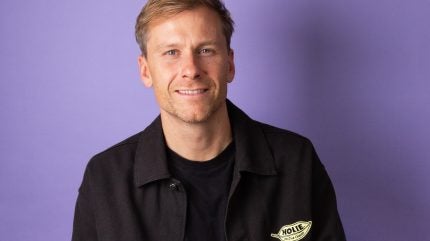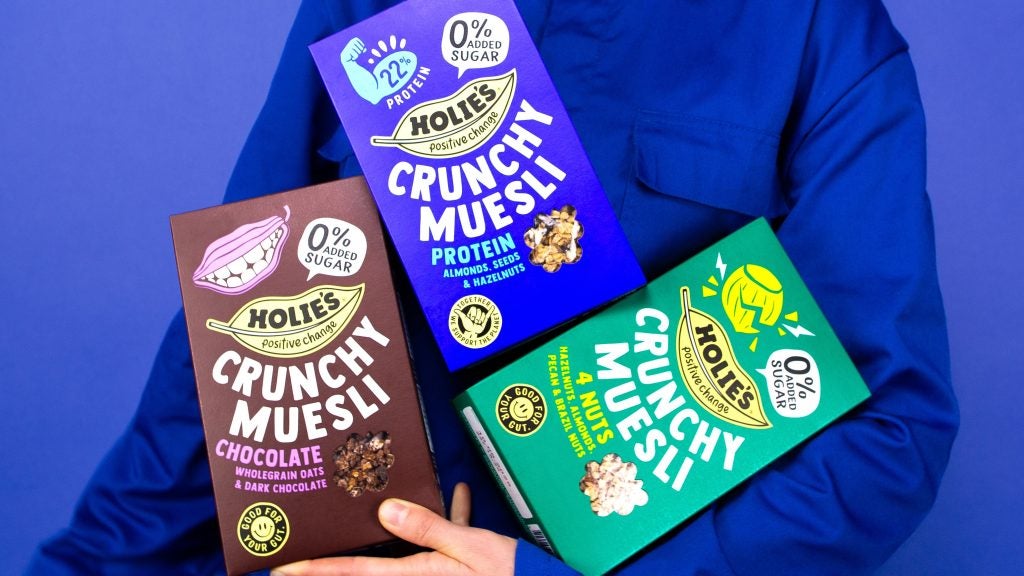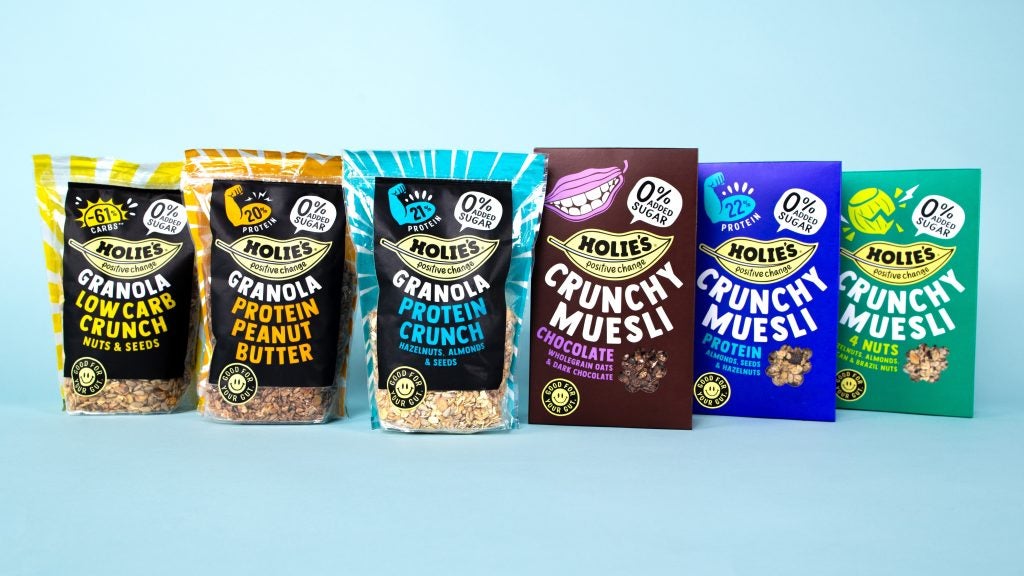
Dutch cereal brand Holie’s was set up by Merick Schoute and Valentijn van Santvoort in the Netherlands in 2018 with a view to disrupt breakfast cereals its with better-for-you granolas and muesli.
The Amsterdam-headquartered business looks to shake up cereals with products it deems are healthier than other competitors in the space, being free from added sugars and sweeteners and high in protein and fibre.

Discover B2B Marketing That Performs
Combine business intelligence and editorial excellence to reach engaged professionals across 36 leading media platforms.
Holie’s has more than 20 SKUs sold in retail in the Netherlands and Belgium and booked €13.4m ($14m) in annual revenue for 2024. Last month, the group launched in the UK market through online retailer Ocado and is striving to expand its presence here through more major retailers, independent stores and wholesalers later this year.
Just Food sat down with Holie’s co-founder and CEO Merick Schoute to discuss the company’s expansion and NPD plans and why it feels well placed to compete against cereal heavyweights and other better-for-you players in the space.
Fiona Holland (FH): What are Holie’s main growth goals for the year ahead?
Merick Schoute (MS): We really started at my kitchen table and six years later we’re now the second largest brand in the Netherlands, only behind Quaker. In Belgium, we’re almost a top three brand.
For us, going to the UK was really logical, but also a dream, because you guys have a big cereal culture. I think our brand tone of voice, it has been English from day one. We really have set this up as a global brand, it also makes sense.

US Tariffs are shifting - will you react or anticipate?
Don’t let policy changes catch you off guard. Stay proactive with real-time data and expert analysis.
By GlobalDataOur goal for next year is to really get our brand into big retail, but also more in the independent channels as well… [In] mid-Feb, two full time British employees will start, and we’re opening up our London office. Their job is really to get the brand name and the brand product really out there. We currently have one [UK] client that is Ocado, and we really saw that as a pilot to see if consumers were interested in the product, if the same products were performing well. The good thing about Ocado, it’s big enough for us to start, but they also provide a lot of data and a lot of consumer insights on the performance. It’s insane, we see big traction, so for us that gave us all the confidence to now go all in for the UK market.
FH: Are you available anywhere else besides Ocado? Are you looking to expand in retail in the UK?
MS: We have several meetings planned… For us it was really important to start there, and now that we see that the traction is there, the data is there, the consumer feedback is really positive. People see the same white spot as we do, and that is just that even the healthy brands in the UK don’t even come close to our nutritional value. The category is in sharp decline and I think also there are mainly old school, farm-style, dull brands in the category, so we really see a place for disruption.
FH: Within better-for-you cereals, are there specific areas where you see major growth opportunities?
MS: Our health philosophy is the following: we never add sugar, and for us, not adding sugar is more extreme than for other brands, because we also include every hidden sugar that is out there.
If you think about coconut sugar or date syrup or agave, or fruit juices, we all consider that added sugar, because it’s basically just sugar, right? We also don’t use sweeteners. The only thing we use is a chicory root fibre… which [means] that our whole portfolio is without added sugar, but also low in natural sugar. It’s all crunchy and it’s all good for your gut, so I think that’s the hygiene layer of our business. But next to that, I’d say 70% of our portfolio also is high in protein or low in carb, which says a lot about where we see that the growth comes from.
What you see is that a lot of brands they have a really sugary products and they add extra protein to that, or they have a full range in which they have like 10 products, and then there are two low in sugar.
I think the novelty of our concept and our brand is that we have over 24 products divided in three concepts – two in cereals and one in bars – that are all low in sugar, all without added sugar, all good for your gut, and of which 70% has extra functionals such as high protein and low carb.
For us, the health consumer is really not like a side project of our business. It’s really the core, and there’s no brands out there. Bio&Me, Spoon, Surreal, they all are playing health cards, but if you look at the ingredients and [nutritional value], they don’t come close to what we offer. Consumers nowadays are more and more aware.
FH: Where are your main markets? Are you planning on entering any new ones in the next 12 months?
MS: We’re fully focusing on our current markets, which [are] the Netherlands, and Belgium, so Benelux, and next to that, all of our focus is on the on the UK. Last year, we raised €1.7m ($1.8m) to accelerate growth in the UK. That’s why we’re hiring a team, that’s why we’re setting up an office.
We’ve always been a retail-first brand, because we believe that healthy living should be easy and joyful, it’s also about accessibility… In the supermarket, our goal for next year is really to have at least one or two top five retailers in the UK listing our product, or at least closing a deal with them. The first talks have been very promising, so we’re confident that we’ll make that happen. But also, we see a lot of opportunity in more grass roots places, like smaller shops and more premium channels in cities, to increase the brand awareness and street presence as well.
FH: In terms of the markets where you make the most revenue, is that the Netherlands?
MS: I’d say the Netherlands is around 75% and Belgium is 25%, but as I said, we’re almost a top three player in Belgium as well. This year we expect to grow up to €20-21m, and that’s only Benelux. We hope that the UK can outgrow the Benelux in a couple of years.

FH: What are you expecting in terms of volumes for the year?
MS: Last year we sold seven million products in total. This year we want to grow to 11 or 12 million products, and again, that’s excluding the UK. We really see UK as [starting from] day one again. We’re a Dutch brand, and we fully realise it’s going to be a marathon and not a sprint, so we want to learn. We want to grow sustainably.
FH: You also make snack bars, are they launching through Ocado as well?
MS: No, because we only just launched it after the summer in the Netherlands and we wanted to see the initial traction first… The funny thing is, we’re solving exactly the same problem. We’re fighting the same as leading competitors. The sugar problem is just as high as in breakfast and we also developed a product that didn’t exist before we developed it.
We’re expanding fast in new products and new flavours in the Benelux but the goal will be to launch that in the UK as well in 2025. Out of the traction, we see that consumers really like it. It makes total sense to add that to the mix. We also have gluten-free granola we also plan on launching that [in UK]. We have a broad range and a lot of ammunition to fire.
FH: Are you looking to expand the product range further?
MS: We’re launching new flavour bars and new flavour granola in a few weeks, and those will also be available for the UK. We’re working on a bigger concept, I can’t share yet the details there, but we’re working on a new concept in breakfast cereals to launch later this year.
Sometimes, for the bars for example, the development took more than two years because if you don’t add sugar, you don’t add sweeteners, all the ingredients must be plant-based, the natural sugar must be below five grams. You know, we make life pretty hard for ourselves, and sometimes, developing a product takes so much time.
FH: Do you think the better-for-you cereals category has the potential to take over from the major brands in the space?
MS: Within six years we grew from nobody knowing us to being the second largest brand here in the Netherlands, which means that at least for Dutch standards, and also for Belgium standards, we managed to take a super health proposition and turn it into a mainstream solution. We really touch the nerve there, and I think we could do the same in the UK.
In the UK, what I underestimated is if you walk into a Tesco, you see a full aisle, like a full street of cereals. I’d say 90% is still really, the classic Coco Pops, corn flakes, frosted flakes, traditional cereals. Whilst in the Netherlands, there was already quite a small part of the total category where granola-like products were already way bigger than the than the classic Kellogg, Nestlé proposition. That might take a little bit of time, but so far, the combination of adding a fun, disruptive brand combined with super healthy proposition that apparently is able to go mainstream, I think we’re able to pull that off in the UK.
FH: Is the US an attractive market for you? Is it a bit more challenging?
MS: It’s also a personal dream. Tony’s Chocolonely is a Dutch brand. I think their playbook for… becoming a player in the UK, that playbook has been really successful, and we know them very well and they’re also doing really [well] in the US. I hear stories that it’s hard to become a profitable business there because of the high supply chain challenges, and it’s of course also very far away.
In essence, we already have a lot of people from the UK and the US emailing us every week, like, ‘Hey guys, I was in Amsterdam the other day, I bought your product. Can I please buy it online? Because there’s nothing like it in the UK or US.’ I know that’s not solid market research, but it says something for us about the competitive advantage we still have.
I’m not saying yes, but there’s quite a chance that after the UK, we might make a really big jump into the US.
FH: Are there any other markets you’re interested in?
MS: Cereal is quite a global concept. The way we see export, we divide it into two categories. One is countries [where] we want to really build ourselves, with a local team, with a local office, really don’t give your brand to like a distributor, but really do it yourself: Belgium, the Netherlands, UK, US in the future, maybe Germany and France as well.
The other category is countries that are are super interesting, but we know for sure that we’ll never open a local office there. For those countries, you would need a distributor. I’m saying, for example, Australia, we’re now in talks with a distributor for Australia. We also speak to other distributors, but for us, it’s really important to keep focus, because everything you do it costs time. We’re still with a relatively small team here in Amsterdam, only 16 people, two in the UK, one in Belgium. It’s a small team, and we really need to protect each other so that we don’t do too much.
FH: And production is done with a co-manufacturer?
MS: We mainly produce in the Netherlands. We also produce some products in Germany, just over the border. If the UK really kicks off, in time it would make sense to produce locally, but before you do that, you want to have more proof that the market is big and a success.
FH: Would you ever bring production in-house?
MS: Our core is really we’re a marketing and sales organisation that develops and owns their own recipes. We create every recipe from scratch ourselves. So far, we hire and work with co-manufacturers because that is just fast and easy.
Getting a factory as full as possible is a totally different game than building a brand. For example, for the granola, I remember when I started, I had to order 5,000 kilograms of granola, and I [thought], okay, how on earth am I going to sell that? Now it’s millions of kilograms, and we are in talks and we’re also co-investing in a new production line with long-term contracts. It’s not our own factory, but also it kind of is.
As you grow, you will see that your capacity demands increase fast, and then maybe at some point it would make sense to, like Oatly does, partly produce yourself. If you have really big volumes, it might be super interesting to open your own somewhere, but I think it will always be a combination.

FH: You mentioned that you raised some funds last year. Are you looking to raise again?
MS: Not at the moment. We’re also lucky that we’re not a cash-burning organisation, so we’ve been profitable from day one. Of course, if you grow really fast in the UK, then also your cash issue might become bigger, but it’s not that we have the typical path in which we grow really fast, but at a super high cost. We grow really fast while maintaining cash on the control and while remaining profitable, but we do feel that if the UK kicks off, so one or two big [retail] deals, then we want to raise again, probably.
FH: Are consumers prepared to pay a premium for healthier cereals yet?
MS: I think we’re still quite competitive. A box of granola is £3.50 and muesli £3.70 and it’s 350/400g… For us, that has always been super important, that we don’t want to be a brand only for the happy few. We want to have the potential to really be a mass market brand.
Yes, sugary products are cheaper, and our margins are okay but their margins might be way higher, I don’t know. For us, it’s really important to make sure that we’re in line, and that price is not a big issue.
FH: Have you not seen consumers trading down in cereals? Are you facing competition from private label?
MS: I’d say price is really an issue in the absence of value, and people really value our recipes over what private label offers. I think private label, of course, they will [produce] some low sugar options, or maybe they already have, but again, other brands, private label, also lack credibility on health. There’s just no one that has 24 products all according to the same health philosophy. By being super-innovative, super-strict on quality, we’re always a couple of steps ahead at least. That’s how it feels.



